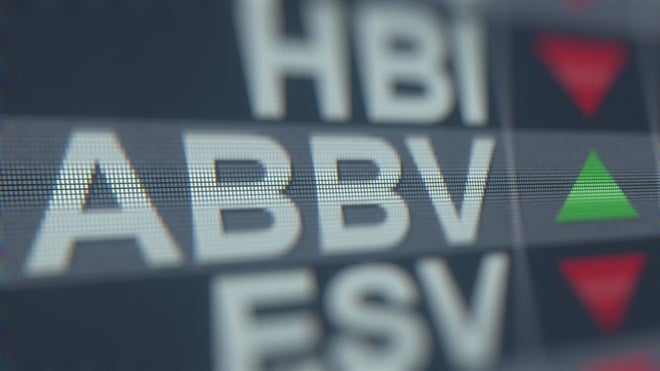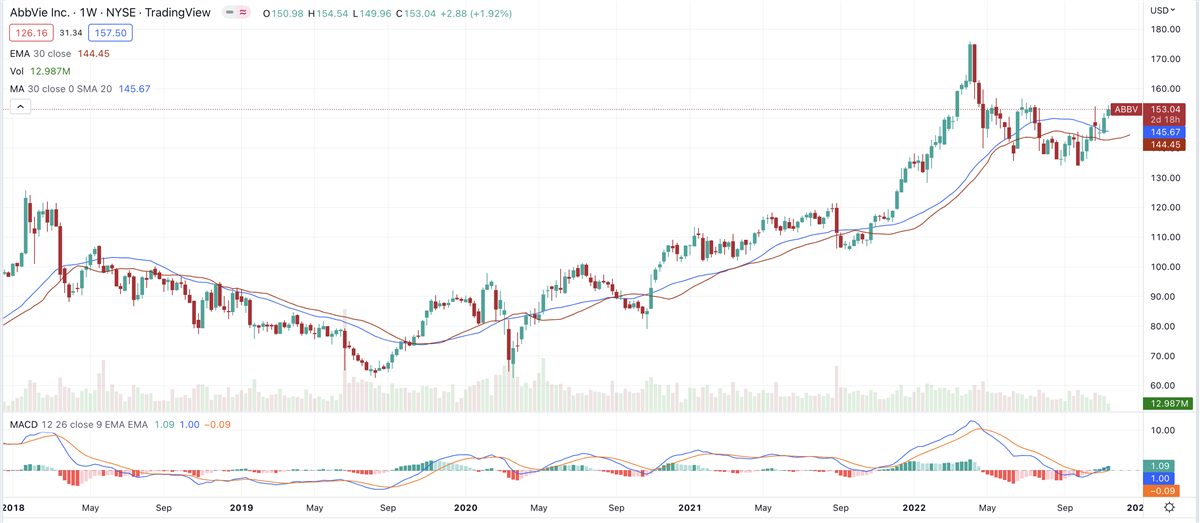

Shares of mega-cap pharmaceutical AbbVie (NYSE: ABBV) added to their recent uptrend Tuesday, closing at $153.04, up $1.30, or 0.86%. Shares have been in rally mode since the company reported its third quarter in late October.
The company specializes in medications for virology, immunology, oncology and other applications and conditions. Its biggest seller is Humira, which can treat a number of conditions, including arthritis, plaque psoriasis, ulcerative colitis and Crohn's disease.
In the quarter, the company earned $3.66 per share on revenue of $14.8 billion. MarketBeat earnings data for AbbVie show the company beat on the bottom line, but missed on the top line.
For the full year, Wall Street expects AbbVie to earn $13.86 per share, which would be an increase of 14% over 2021. Next year, earnings are expected to drop by 16% to $11.71 per share.
So why the expected decline? A couple of things are going on. For starters, revenue has been decelerating since late 2020. In late July, the company said sales of leukemia treatment Imbruvica were dropping.
Another thing, it’s widely known that the company will face biosimilar competition for brand-name Humira. Exclusivity on the patent expires next year.
According to analyst data compiled by MarketBeat, no fewer than 10 analysts downgraded AbbVie or lowered their price targets on the stock since May of this year. The consensus rating is “hold,” with a price target of $156.61, which represents an upside of just 2.33% over where shares closed Tuesday.
That’s a price target for the next 12 to 18 months. Clearly, it would be unusual for a stock to take that long to rise 2.33%, although it could certainly rally and then pull back.
Forming Base Since April
AbbVie’s chart shows a consolidation that began in April, roughly at the same time a rally attempt in the S&P 500 failed. So far, AbbVie has consolidated 24%. When this current consolidation began, the stock had already rallied 48% since a breakout in early December. That prior run-up is what helps give the stock a year-to-date return of 16.51%, despite the seven-month consolidation.
In October AbbVie said the FDA had given the OK for Rinvoq, an oral therapy to treat a chronic inflammatory condition that was not previously covered. In April, regulators approved Rinvoq for a different condition. The additional approval for Rinvoq may boost AbbVie revenue.
Another drug, Skyrizi, which treats adults with plaque psoriasis, also has the potential to drive revenue.
With that giant market cap, you’d be correct in guessing that AbbVie is a component of the S&P 500. Because the healthcare sector is home to so many large companies, AbbVie is only the fifth largest stock in the sector.
The five most heavily weighted healthcare names, and their proportions of the index are:
- Unitedhealth Group (NYSE: UNH) 9.41%
- Johnson & Johnson (NYSE: JNJ) 9.07%
- Eli Lilly & Co (NYSE: LLY) 5.52%
- Pfizer (NYSE: PFE) 5.45%
- AbbVie 5.41%
The sector as a whole, as tracked by the Health Care Select Sector SPDR ETF (NYSEARCA: XLV), is up +7.41% in the past month.
Industry Leader Merck
Fellow sector component Merck & Co. (NYSE: MRK) is the best performer within the pharmaceutical sub-industry, which is also home to AbbVie. Merck is up 33.64% year-to-date, helped by a breakout that occurred just before the company’s late October earnings report.
Since then, Merck shares have been essentially trading in a sideways pattern. The stock closed Tuesday at $99.60, down 4% from its November 9 all-time high of $103.75, and 7.7% above its 50-day average.
While Merck is extended from its breakout, AbbVie’s current consolidation may show more potential, although would-be investors may have to be patient while they wait for a proper buy point to present itself. 




